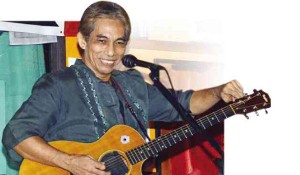Musician Joey Ayala to run for president if…

JOEY Ayala grew up with a more diverse pop sound: Acoustic, band, various sounds. RIZ PULUMBARIT/CONTRIBUTOR
Music artist Joey Ayala, known for fusing the sounds of indigenous Philippine instruments with modern music, said he might consider running for president if the job came with a handsome paycheck.
“Kung sasali ako sa pulitika gusto ko malaki ang bayad. Kasi ang temptations ang laki,” Ayala shared in a sitdown interview with the Inquirer on Wednesday before his performance at Sev’s Café in Manila.
“’Pag presidente, dapat P1 million a day ang suweldo niyan kasi nagki-create ng tension ’yung concept ng selflessness and public service,” Ayala said.
He said some people might think their foray into politics was borne out of a noble cause “but the gut instinct of everything that lives is to work for self-benefit.”
“If you counter that with idealism, you’ll run into a lot of tension that’s why you see a lot of corruption… in positions that are dedicated to public service,” he added.
Haunting music
The man behind haunting melodies such as “Walang Hanggang Paalam” and “Buwan, Buwan” was born Jose Iñigo Homer Lacambra Ayala on June 1, 1956, in Fortich, Bukidnon.
Ayala said he grew up at the Del Monte plantation in Malaybalay, Bukidnon. His mother was the editor of the company newsletter while his father was a teacher.
In jest, he summarized his parents’ love story as: “Tanan sila… Rich boy, poor girl, then poor girl gives birth to a human pineapple,” referring to himself.
Ayala studied under the Jesuits from grade school to college. He finished grade school and high school at the Ateneo de Manila University in Quezon City before his family moved to Davao.
“Though I considered myself a ‘peace man’ sort of fellow, a ‘hippie,’ Davao in the early 1980s was practically a war zone and my awareness of life’s dualities, ironies and disparities grew keener,” he said.
Ayala explained that even though both of his parents were creative and musically-inclined, they did not encourage him to pursue music.
“In the late 1950s, ang musician associated with night clubs, kabaret. ’Yun ’yung mga preconceptions ng magulang nila ’pag musician. Kasama mo ang mga mababang uri ng tao,” he said.
More diverse
Ayala said the music he grew up with in the 1960s and 1970s was very different from today. “Pop [music] then I think was more diverse than pop now,” he said.
He said he grew up with acoustic sounds, band sounds and “irregular sounds.”
“Melodically, rhythmically, in terms of arrangements, hindi pa masyadong technologically-driven [then] so the sounds were human sounds,” he said. “Hindi pa ’yung samples and sequences na computer- or technologically-driven.
On music piracy, Ayala considers it a form of “flattery.”
“Pumunta ako minsan ng Quiapo, curious ako, kasi lagi ko naririnig na ang dami doong [fake CDs]. Meron [nga]! Katabi ko pa Yoyoy Villame, beinte-singko pesos!” he said. “What an honor [for my CD to be placed] beside Yoyoy Villame’s whom I consider to be a national artist for music, although hindi siya hinihirang na ganoon kasi ‘novelty.’”